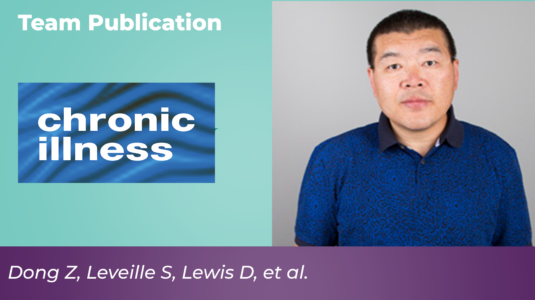People with diabetes want to read their clinicians’ notes, are accessing them at high rates, and report understanding the notes and benefiting from reading them. Clinicians can encourage further engagement by enhancing the readability of notes and discussing the availability of notes with patients.
Leveille, Suzanne
Patients Contributing to Visit Notes: Mixed Methods Evaluation of OurNotes
OurNotes interests patients, and providers experience it as a positive intervention. Participation by patients, care partners, clinicians, and electronic health record experts will facilitate further development.
Validation of a brief scale to assess ambulatory patients’ perceptions of reading visit notes: a scale development study
Four studies were used to evaluate the construct validity of a benefits and risks scale. Study 1 refined the items; study 2 evaluated underlying factor structure and identified the items; study 3 evaluated study 2 results in a separate sample; and study 4 examined factorial invariance of the developed scale across educational subsamples.
The findings suggest that the four-item benefits scale has excellent construct validity and preliminary evidence of generalising across different patient populations. Further scale development is needed to understand perceived risks of reading open notes.
Patients Evaluate Visit Notes Written by Their Clinicians: a Mixed Methods Investigation
Patients overwhelmingly report understanding their visit notes and usually find them accurate, with few disparities according to sociodemographic or health characteristics. They have many suggestions for improving their quality, and if they understand a note poorly or find inaccuracies, they often have less confidence in their clinicians.
Frequency and Types of Patient-Reported Errors in Electronic Health Record Ambulatory Care Notes
As health information transparency increases, patients may perceive important errors in their visit notes, and inviting them to report mistakes that they believe are very serious may be associated with improved record accuracy and patient engagement in safety.
Sharing Psychotherapy Notes with Patients: Therapists’ Attitudes and Experiences
Evidence suggests that the practice of sharing clinicians’ notes with patients via online patient portals may increase patient engagement and improve patient–clinician relationships while requiring little change in providers’ workflow. Authors examined clinical social workers’ experiences and attitudes related to open psychotherapy notes using focus groups and telephone interviews.
The Views and Experiences of Clinicians Sharing Medical Record Notes With Patients
In this web-based survey study of 1628 clinicians, most viewed note sharing positively (74% agreed that it is a good idea and 74% viewed shared notes as useful for engaging patients in their care), and 37% of physicians surveyed reported spending more time in documentation. Physicians with more years in practice and fewer hours spent in patient care had more positive opinions overall.
Embracing the new age of transparency: mental health patients reading their psychotherapy notes online
Our pilot findings indicate that most patients who read open therapy notes find them valuable for understanding and engaging in their mental health care, with minimal adverse effects.
Tackling Ambulatory Safety Risks Through Patient Engagement: What 10,000 Patients and Families Say About Safety-Related Knowledge, Behaviors, and Attitudes After Reading Visit Notes
Background: Ambulatory safety risks including delayed diagnoses or missed abnormal test results are difficult for clinicians to see, because they often occur in the space between visits. Experts advocate greater patient engagement to improve safety, but strategies are limited. Patient access to clinical notes (“OpenNotes”) may help close the safety gap between visits.
Methods: We surveyed patients and families who logged on to the patient portal and had at least one ambulatory note available in the past 12 months at two academic hospitals during June to September 2016, focusing on patient-reported effects of OpenNotes on safety knowledge, behaviors, and attitudes.
Student-accessible healthcare records: A mixed-method study of college student and provider
This mixed methods study evaluated student and provider attitudes and expectations about offering students online access to their student health services visit notes (open notes). Six (N=6) health care providers from four public universities in northeastern Massachusetts participated. Qualitative interviews were completed by students (N=14) from one University in fall of 2013 and an online survey was completed at two universities in Spring of 2014. Attitudes and expectations were explored using qualitative data and descriptive statistics were used to analyze survey questions. Students’ interviews revealed that they desire control over their health and open notes would give them insight and involvement in their health care. Survey data supported these themes. In contrast, providers worried about how it could impact provider-patient relationships. Open notes has the potential to promote students’ understanding and responsibility for their healthcare, which could assist students in their transition from pediatric to adult health care.




